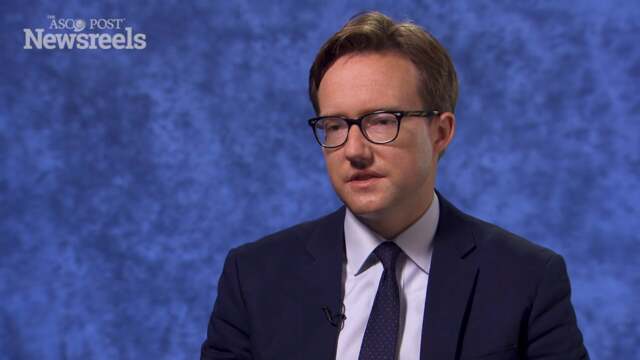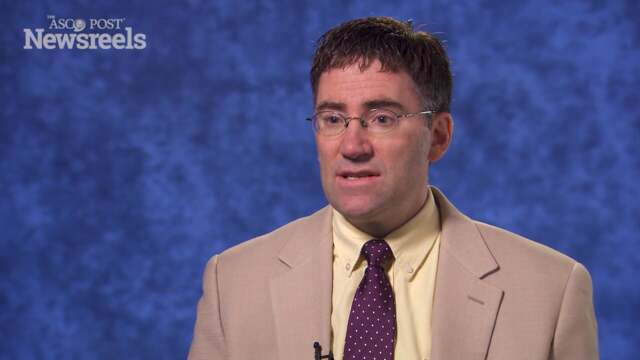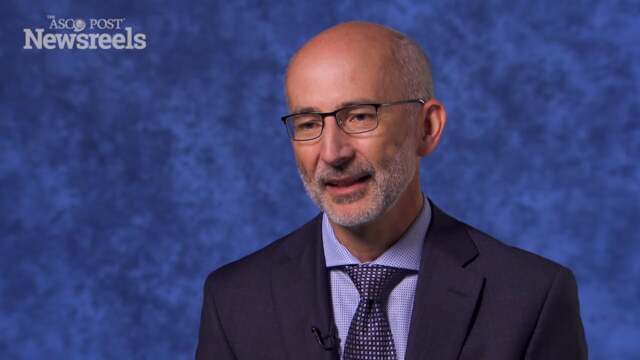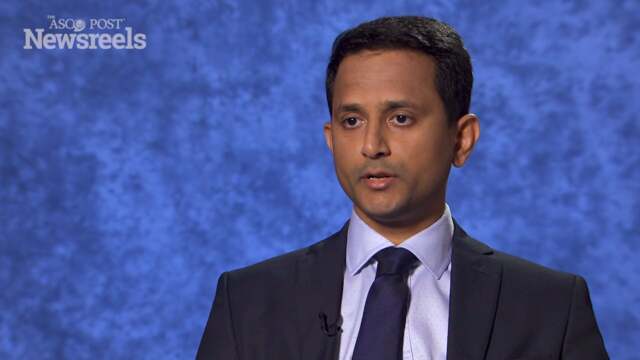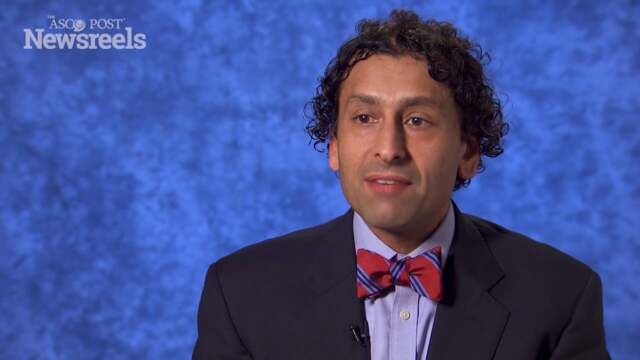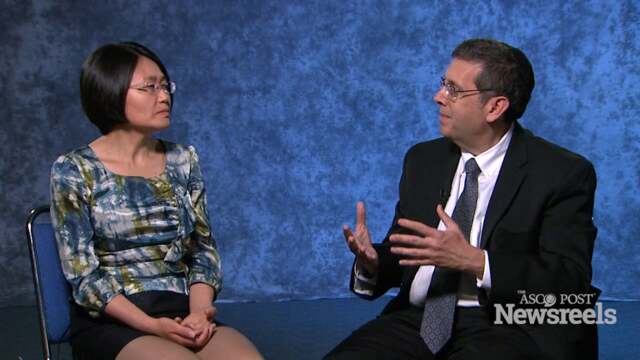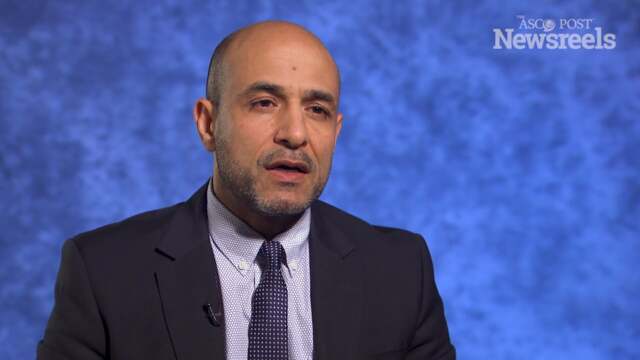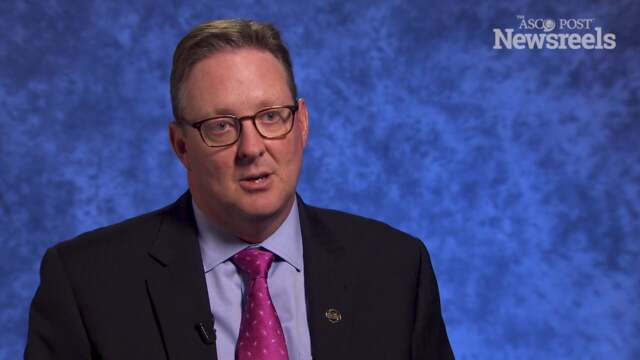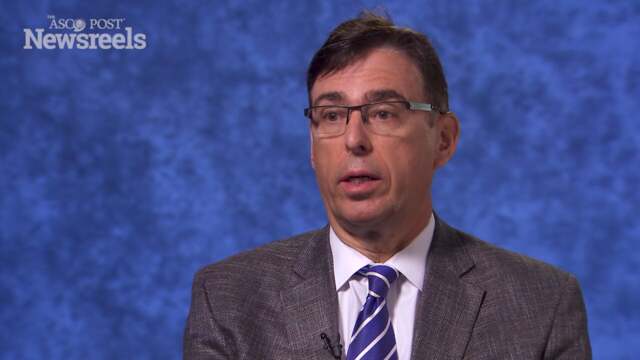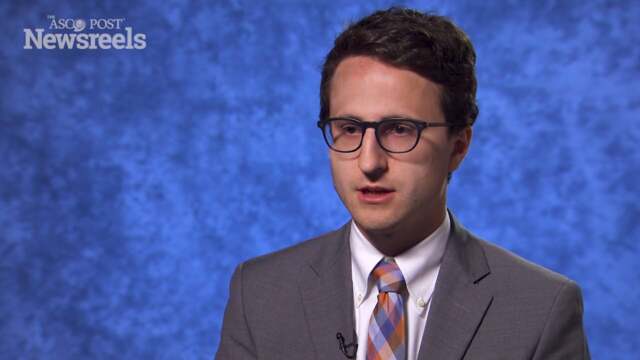2017 ASTRO Annual Meeting
Long-Term Survival Rates More Than Double Previous Estimates for Locally Advanced Lung Cancer
THE LONG-TERM RESULTS of a phase III clinical trial indicate that survival rates for patients receiving chemoradiation for unresectable, locally advanced non–small cell lung cancer (NSCLC) may be mor...
EXPERT POINT OF VIEW: Geraldine M. Jacobson, MD, MPH, MBA
GERALDINE M. JACOBSON, MD, MPH, MBA, ASTRO Secretary/Treasurer, Professor and Chair of Radiation Oncology at the West Virginia University School of Medicine, Morgantown, went into more detail about t...
Pelvic Radiation Therapy Preferred Over Brachytherapy Plus Chemotherapy in Treatment of High-Risk Endometrial Cancer
VAGINAL CUFF BRACHYTHERAPY plus chemotherapy failed to show superiority over pelvic radiation therapy for women with high-risk stage I–II endometrial cancer in a phase III trial.1 Furthermore, vagina...
Expert Point of View: Paul Harari, MD
COMMENTING ON THIS STUDY, ASTRO President Paul Harari, MD, was enthusiastic about the results. Dr. Harari is the Jack Fowler Professor and Chairman of the Department of Human Oncology at the Universi...
Cutting Radiation Exposure by 50% Appears Safe and Effective in HPV-Positive Head and Neck Cancer
AGGRESSIVE REDUCTION in radiation therapy appears to be a potential win-win situation for patients with human papillomavirus (HPV)-associated oropharyngeal squamous cell carcinoma, according to the r...
Expert Point of View: Brian G. Czito, MD, and Phuoc T. Tran, MD, PhD
“THESE PRELIMINARY STUDY RESULTS suggest that combining these modalities [immunotherapy and radiation therapy] can halt tumor growth in 30% to 57% of patients, with the radiation-induced tumor respon...
Immunotherapy Plus Radiation Appears Active in Patients With Solid Tumors and Lung or Liver Metastases
THE NOVEL COMBINATION of immunotherapy with ipilimumab (Yervoy) plus radiation achieved a clinical benefit in up to 57% of patients with solid tumors and metastases to the lungs or liver, according t...
Expert Point of View: Brian G. Czito, MD, and Benjamin Movsas, MD
BRIAN G. CZITO, MD, a radiation oncologist at Duke Cancer Institute in Durham, North Carolina, commented on the study presented by Iyengar et al at the 2017 American Society for Radiation Oncology An...
Consolidative Radiation Therapy: New Paradigm for Limited Metastatic NSCLC?
ADDING CONSOLIDATIVE RADIATION therapy to maintenance chemotherapy had a robust effect on preventing disease progression compared with maintenance chemotherapy alone in patients with limited metastat...
ASTRO 2017: Shorter Course of Radiation Treatment Safe for Breast Cancer Patients Under 50
A higher-dose, shorter form of radiation is safe, effective, and no more damaging to the breast tissue or skin of breast cancer patients under age 50 than it is in older patients. This is the finding ...
Shorter Course of Radiation Therapy Safe for Younger Women With Breast Cancer
A higher-dose, shorter form of radiation is safe, effective, and no more damaging to the breast tissue or skin of women with breast cancer under age 50 than it is in older patients, according to findi...
ASTRO 2017: Uninsured Patients With Cancer Saw Increased Coverage for Care Following Medicaid Expansion
A new study found that Medicaid expansion enacted as part of the Patient Protection and Affordable Care Act (ACA) improved coverage for care for patients with cancer receiving radiation therapy and po...
ASTRO 2017: Accelerated Breast Radiation Therapy Following Mastectomy Can Shorten Treatment Time While Maintaining Tumor Control
Radiation therapy following mastectomy for intermediate-stage, high-risk breast cancer can be shortened from 5 to 3 weeks while maintaining tumor control rates in the breast and surrounding region tha...
William A. Hall, MD, on Prostate Cancer: Results From a Study of Three Treatment Modalities
William A. Hall, MD, of the Medical College of Wisconsin, discusses trial findings on androgen deprivation and radiation alone, compared with androgen deprivation, radiotherapy, and surgery in men wit...
Christopher R. Kelsey, MD, on DLBCL: Study Results on Consolidation Radiotherapy
Christopher R. Kelsey, MD, of Duke University Medical Center, discusses reducing the radiation dose from 30 Gy to 20 Gy for patients with diffuse large B-cell lymphoma. Phase II findings show this app...
Gerard Morton, MD, on GU Highlights: Expert Perspective
Gerard Morton, MD, of Sunnybrook Odette Cancer Centre, summarizes a session that included discussion of late toxicities of radiotherapy for locally recurrent prostate cancer; using chemotherapy instea...
Shrinivas Rathod, MD, on NSCLC: Quality-of-Life Outcomes From an IAEA Trial
Shrinivas Rathod, MD, of the University of Manitoba, discusses phase III study results on optimization of treatment of advanced non–small cell lung cancer using radiation therapy and chemotherapy (Abs...
Bhishamjit S. Chera, MD, on Oropharyngeal Squamous Cell Carcinoma and HPV-16: Expert Perspective
Bhishamjit S. Chera, MD, of the University of North Carolina, discusses quantification of human papillomavirus 16 in circulating tumor DNA during de-intensified chemoradiation therapy for favorable-ri...
ASTRO 2017: Patients With Breast Cancer Find Radiation Therapy Experience Better Than Expected
A new survey finds breast cancer patients’ actual radiation therapy experiences largely exceeded their expectations. The survey, which addressed the fears and misconceptions regarding radiation ...
ASTRO 2017: Aggressively Reduced Radiation Therapy May Benefit Some Patients With HPV-Related Throat Cancer
For certain patients with oropharyngeal cancer caused by the human papillomavirus (HPV), an aggressive reduction of radiation therapy after surgery may provide cancer control while simultaneously redu...
ASTRO 2017: GOG-249 Confirms Adjuvant Pelvic Radiation as Standard of Care for High-Risk, Early-Stage Endometrial Cancer
In a new phase III trial report from the National Clinical Trial Network group, NRG Oncology, recurrence-free and overall survival rates for women with stage I–II high-risk endometrial cancer we...
Shulian Wang, MD, and Benjamin Movsas, MD, on Breast Cancer: Radiation Therapy After Mastectomy
Shulian Wang, MD, of the National Cancer Center in Beijing, and Benjamin Movsas, MD, of the Henry Ford Health System, discuss study results on the use of hypofractionated radiation therapy after maste...
Tamim Niazi, MDCM, on Prostate Cancer: Results From a Trial on Dose Escalation
Tamim Niazi, MDCM, of McGill University, discusses phase III study findings on hypofractionated, dose-escalation radiation therapy for high-risk adenocarcinoma of the prostate (Abstract 281).
Maria Werner-Wasik, MD, on Lung Cancer Highlights: Expert Perspective
Maria Werner-Wasik, MD, of Thomas Jefferson University Hospital, summarizes a session on NSCLC that included discussion of a quality-of-life trial on optimizing treatment; chemotherapy and radiotherap...
Jeffrey D. Bradley, MD, on NSCLC: Results of the RTOG 0617 Trial
Jeffrey D. Bradley, MD, of Washington University School of Medicine, discusses long-term phase III findings on standard-dose vs high-dose conformal chemoradiation therapy with or without cetuximab for...
ASTRO 2017: Immune Response May Be Prognostic for Prostate Cancer Survival, Recurrence, and Response to Radiation Therapy
A new study finds that immune response in prostate cancer may be able to forecast how patients will respond to radiation therapy, as well as their likelihood of disease recurrence and survival outcome...
ASTRO 2017: RTOG 0617: Long-Term Survival Rates Improve Previous Estimates for Locally Advanced Lung Cancer
Long-term results of a phase III clinical trial indicate that survival rates for patients receiving chemoradiation for unresectable, locally advanced non–small cell lung cancer (NSCLC) may be mo...
Marcus E. Randall, MD, on Endometrial Cancer: Results From a Gynecology Oncology Group Study
Marcus E. Randall, MD, of the University of Kentucky, discusses phase III study findings on pelvic radiation therapy vs vaginal cuff brachytherapy followed by paclitaxel/carboplatin chemotherapy in pa...
Juanita Crook, MD, on Prostate Cancer: Results From an NRG/RTOG Brachytherapy Trial
Juanita Crook, MD, of the University of British Columbia, discusses late toxicity findings on transperineal ultrasound–guided brachytherapy for locally recurrent prostate cancer after external-beam ra...
James E. Bates, MD, on Pediatric Cancer Survivors: New Findings on Late Effects
James E. Bates, MD, of the University of Florida, discusses a volumetric dose-effect analysis of late cardiotoxicity, results from the Childhood Cancer Survivor Study (Abstract 4).
ASTRO 2017: Radiation-Immunotherapy Combination May Benefit Some Patients With Late-Stage Cancer
A new study involving patients with stage IV cancer has found that treatment with radiation therapy and immunotherapy can slow tumor growth by stimulating the body’s immune system to attack the ...
ASTRO 2017: Distress in Patients Receiving Radiation Associated With Missed Appointments, Hospitalization
Psychological distress has long been associated with negative health outcomes for patients with cancer, though specific reasons remain unclear. A new study has found that roughly half of all patients ...
ASTRO 2017: Adding Radiation to Maintenance Chemotherapy May Benefit Patients With Limited Metastatic NSCLC
For patients with limited metastatic non–small cell lung cancer (NSCLC), adding radiation therapy before maintenance chemotherapy may curb disease progression when compared to maintenance chemot...
ASTRO 2017: Biomarker Blood Test Predicts Survival Following Localized Lung Cancer Treatment
A new study demonstrates that a blood test to detect cancer may predict treatment outcomes for patients with localized non–small cell lung cancer (NSCLC) and afford physicians additional lead ti...
ASTRO 2017: IAEA Trial: Safety, Efficacy of High-Dose Brachytherapy Plus Pelvic Radiation for Cervical Cancer
Findings from a new multicenter, international clinical trial confirm the effectiveness of high-dose brachytherapy, or internal radiation therapy, for managing locally advanced cervical cancer. Tumor ...
ASTRO 2017: Urban Cancer Center Finds 75% of Its Patients With Depression Were Previously Undiagnosed
A new study of patients at an urban cancer center points to a potentially serious problem that may limit the impact of clinical cancer care—undiagnosed depression. Among the 40% of patients at ...
